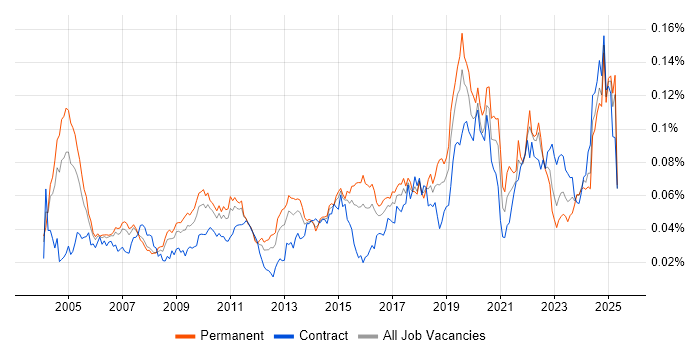Quantitative Analysis
UK
The table below provides summary statistics and salary benchmarking for jobs requiring Quantitative Analysis skills. It covers permanent job vacancies from the 6 months leading up to 5 March 2026, with comparisons to the same periods in the previous two years.
| 6 months to 5 Mar 2026 |
Same period 2025 | Same period 2024 | |
|---|---|---|---|
| Rank | 656 | 579 | 784 |
| Rank change year-on-year | -77 | +205 | +187 |
| Permanent jobs citing Quantitative Analysis | 20 | 90 | 35 |
| As % of all permanent jobs in the UK | 0.028% | 0.20% | 0.045% |
| As % of the Processes & Methodologies category | 0.035% | 0.21% | 0.051% |
| Number of salaries quoted | 6 | 55 | 27 |
| 10th Percentile | £67,500 | £77,500 | £34,187 |
| 25th Percentile | £82,500 | £85,000 | £42,750 |
| Median annual salary (50th Percentile) | £85,000 | £112,500 | £61,000 |
| Median % change year-on-year | -24.44% | +84.43% | -1.64% |
| 75th Percentile | £87,500 | £141,875 | £95,063 |
| 90th Percentile | £95,000 | £152,500 | £115,000 |
| UK excluding London median annual salary | £55,000 | £47,500 | £46,250 |
| % change year-on-year | +15.79% | +2.70% | -22.92% |
All Process & Methodology Skills
UK
Quantitative Analysis falls under the Processes and Methodologies category. For comparison with the information above, the following table provides summary statistics for all permanent job vacancies requiring process or methodology skills.
| Permanent vacancies with a requirement for process or methodology skills | 56,435 | 42,676 | 68,967 |
| As % of all permanent jobs advertised in the UK | 78.59% | 93.36% | 87.81% |
| Number of salaries quoted | 33,915 | 21,866 | 52,740 |
| 10th Percentile | £29,250 | £32,500 | £29,329 |
| 25th Percentile | £38,750 | £45,000 | £40,000 |
| Median annual salary (50th Percentile) | £55,000 | £60,000 | £55,000 |
| Median % change year-on-year | -8.33% | +9.09% | -12.00% |
| 75th Percentile | £76,463 | £81,250 | £75,000 |
| 90th Percentile | £97,500 | £102,500 | £95,000 |
| UK excluding London median annual salary | £50,000 | £55,000 | £50,000 |
| % change year-on-year | -9.09% | +10.00% | -9.09% |
Quantitative Analysis
Job Vacancy Trend
Historical trend showing the proportion of permanent IT job postings citing Quantitative Analysis relative to all permanent IT jobs advertised.

Quantitative Analysis
Salary Trend
Salary distribution trend for jobs in the UK citing Quantitative Analysis.

Quantitative Analysis
Salary Histogram
Salary distribution for jobs citing Quantitative Analysis over the 6 months to 5 March 2026.
Quantitative Analysis
Top 8 Job Locations
The table below looks at the demand and provides a guide to the median salaries quoted in IT jobs citing Quantitative Analysis within the UK over the 6 months to 5 March 2026. The 'Rank Change' column provides an indication of the change in demand within each location based on the same 6 month period last year.
| Location | Rank Change on Same Period Last Year |
Matching Permanent IT Job Ads |
Median Salary Past 6 Months |
Median Salary % Change on Same Period Last Year |
Live Jobs |
|---|---|---|---|---|---|
| England | -65 | 15 | £85,000 | -24.44% | 20 |
| London | -26 | 12 | £85,000 | -25.27% | 11 |
| UK excluding London | -15 | 6 | £55,000 | +15.79% | 10 |
| Scotland | -13 | 3 | - | - | |
| South East | -17 | 2 | £55,000 | -9.84% | 6 |
| Work from Home | +20 | 1 | - | - | 4 |
| North West | -15 | 1 | - | - | 2 |
| North of England | -33 | 1 | - | - | 2 |
Quantitative Analysis
Co-Occurring Skills & Capabilities by Category
The following tables expand on the one above by listing co-occurrences grouped by category. They cover the same employment type, locality and period, with up to 20 co-occurrences shown in each category:
